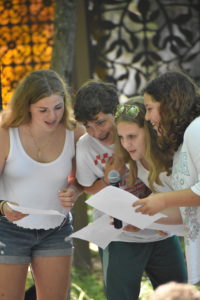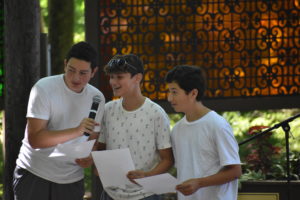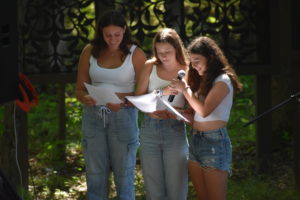The unit of K’far Noar led Saturday morning Shabbat services last week. Their theme was Nitzachon or pushing through a challenge. Below are some of the words they shared.
 By Mila and Evie: I pushed through a challenge when I made it to the top of the tower. I pushed through a challenge when I made it to the top of the tower. Just kidding! Neither of us have made it to the top of the tower. Just because we’re not good at adventure doesn’t mean we’ve never faced a challenge here at camp. The transition from Junior Camp to Senior Camp has been difficult for all of K’far. Switching from a bunk of 12 people to a bunk of 37 people can be challenging. Not to mention that the shlep to and from K’far is so long! We’ve had to find ways to push through the challenges that come with being in Senior Camp. As one of the oldest units in camp, we’ve found ourselves with more responsibility and independence which can be both challenging and exciting. We’ve had to face the fact that our time as campers will come to an end next summer. This has been one of the hardest challenges for us to face, but together we’ve been able to push through it. Sometimes it may seem impossible to push through challenges alone, but here at camp, you’re never alone because you’re surrounded by people who love you and will help lift you to the top of the tower.
By Mila and Evie: I pushed through a challenge when I made it to the top of the tower. I pushed through a challenge when I made it to the top of the tower. Just kidding! Neither of us have made it to the top of the tower. Just because we’re not good at adventure doesn’t mean we’ve never faced a challenge here at camp. The transition from Junior Camp to Senior Camp has been difficult for all of K’far. Switching from a bunk of 12 people to a bunk of 37 people can be challenging. Not to mention that the shlep to and from K’far is so long! We’ve had to find ways to push through the challenges that come with being in Senior Camp. As one of the oldest units in camp, we’ve found ourselves with more responsibility and independence which can be both challenging and exciting. We’ve had to face the fact that our time as campers will come to an end next summer. This has been one of the hardest challenges for us to face, but together we’ve been able to push through it. Sometimes it may seem impossible to push through challenges alone, but here at camp, you’re never alone because you’re surrounded by people who love you and will help lift you to the top of the tower.
By Remy, Dani, Simon and Victoria: Now that we’re in Senior Camp, we are faced with different and new challenges every day. Living with so many people in a private village can be difficult for so many reasons. Like keeping your area clean, finding alone time, and getting camp crud are all challenges of living with so many people. But at the same time, it’s worth it because we can be with the people we love.Yotzeir Or talks about light and darkness. So we have to bring the light into the challenges we face.
By Elad, Arad, and Ian: My name is Ian. I am American and this is my 6th summer at camp. My name is Elad and my name is Arad. We are both Israeli and this is our first summer at camp. When we chose to come to Harlam, we had to fly across the world by ourselves not knowing what to expect. We got here without our friends and family that we know in Israel and we were scared. On the other hand, coming to camp was easy for me. I had to drive an hour to go to a place full of my many friends from past years. After being at camp for a week and a half, we feel different. With the help of our friend Ian and everyone else in K’far, we are more and more comfortable after every day. On opening day, when I was greeting all of my friends, the Israeli campers didn’t know anyone from camp. But after I met them and we talked for a while, we started to be really good friends. This example is our Nitzachon. When we came here without friends, we pushed through this challenge to open up to everyone and meet more people. And now we feel at home!
 By Sofia and Ezra: Ezra and I met in Galil. The more we talked, the closer we became. However, it was difficult to find time to talk since we were living on opposite sides of camp. Now that we’re in Kfar, we’re closer than ever before. K’far is a big transition from Junior Camp. We went from being on the opposite sides of Harlam to living within shouting distance of each other. The Mi Chamocha is all about the freedom to live with the people you love. This year, we were given the freedom to do that. Camp Harlam has placed a lot more trust in us. As we chant the Mi Chamocha, reflect on the freedom that Camp Harlam has given to you to be your true self.
By Sofia and Ezra: Ezra and I met in Galil. The more we talked, the closer we became. However, it was difficult to find time to talk since we were living on opposite sides of camp. Now that we’re in Kfar, we’re closer than ever before. K’far is a big transition from Junior Camp. We went from being on the opposite sides of Harlam to living within shouting distance of each other. The Mi Chamocha is all about the freedom to live with the people you love. This year, we were given the freedom to do that. Camp Harlam has placed a lot more trust in us. As we chant the Mi Chamocha, reflect on the freedom that Camp Harlam has given to you to be your true self.
By Hannah, Samara, and Maddie: At camp, we face and overcome challenges every day, even when you might not notice. Whether it’s cleaning the dirty showers, dunking your head during kef b’mayim, or doing the high ropes for the first time. Shabbat is the perfect time to reflect on your week and celebrate your challenges. As you reflect, you may find yourself thinking about the bad times. But remember all of the good things that come with camp. Such as overcoming your fear of heights, having fun doing water Zumba with your friends, or having perfectly clean showers during shower hour. This week we challenge you to face your fears.
By Sami and Lucy: Pushing through a challenge can mean different things to everyone. It could be as small as the walk up to the K’far Village or as big as finding the courage to leave your home for a month or two. As double sessioners, we’ve faced the challenge of the homesickness we’ve felt while being at camp for so long. But together we’ve pushed through this challenge by remembering why we love camp so much and what makes us want to be here. We remembered the late-night talks, randomly bursting out into song, and all the traditions that make camp so special. As we pray silently, take the time to think about the challenges you’ve faced and how you were able to push through.
 By Tali, Sofia, and Becca: For me, pushing through a challenge means pushing through something that could be hard for me but I know that in the end there is a greater outcome. Going double session is really hard for me and the transition isn’t always great, but I pushed through knowing I had my friends by my side. Whether it’s going on a 10-mile hike or being away from our family for so long, we learn and grow from our experiences and end up having a great summer!
By Tali, Sofia, and Becca: For me, pushing through a challenge means pushing through something that could be hard for me but I know that in the end there is a greater outcome. Going double session is really hard for me and the transition isn’t always great, but I pushed through knowing I had my friends by my side. Whether it’s going on a 10-mile hike or being away from our family for so long, we learn and grow from our experiences and end up having a great summer!
By Sasha, Hannah, and Gabby: Nitzachon is not just pushing through challenges, but it’s also about encouraging and comforting others in times of need. As second sessioners, we know some of our double session friends are missing home. We understand their struggles and remind them of nitzachon and our love of camp. As we entered K’far, we were surprised how different things were than past years. Being combined into one bunk has helped us grow together and bond. Although living with all of our friends is fun, we have all needed to adapt to the new environment in the village. No matter the challenge; whether it’s sharing a bunk with 47 people or having camp crud, we push through the difficulties as one.
